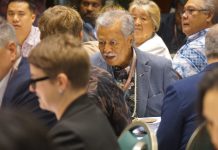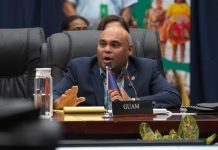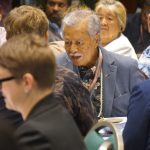The constitutional hearing regarding the case challenging the President of the Republic of Vanuatu over allegations of a conflict of interest in signing the dissolution instrument on 18 November concluded Tuesday after a lengthy nine-hour debate.
Chief Justice (CJ) Vincent Lunabek, who presided over the hearing, emphasised at the outset that the case was not urgent but rather a constitutional matter, and all arguments presented must align with the constitution.
Avock Gorden, representing the claimants (former opposition members), focused his arguments on challenging the President’s decision to dissolve parliament due to an alleged conflict of interest.
He presented submissions to support his case, arguing that the President had violated Article 66, Sub-article (1)(a) of the Constitution.
This provision states that a public official must avoid placing themselves in a position where they have or could have a conflict of interest, or where the fair execution of their duties might be compromised.
Counsel Gorden contended that the President, aware of an impending motion against him, acted swiftly to dissolve parliament just hours after receiving the request from the Council of Ministers (COM).
This, according to the claimants, constitutes a breach of constitutional principles.
During the hearing, CJ Lunabek ruled out certain evidence submitted by the applicant’s counsel. One of these submissions involved statements from Ralph Regenvanu, leader of the Graon mo Jastis Pati (GJP), and Jotham Napat, head of the Leaders Party of Vanuatu (LPV), who had expressed their intention to support the impeachment motion against the President.
However, the CJ dismissed this evidence as irrelevant to the case at hand.
Additionally, the court ruled out the submission involving the first private secretary of the Office of the President, who had allegedly asked the leader of the opposition to withdraw the impeachment motion.
“The CJ reiterated that, “he is not the president,” implying that the actions of the private secretary were not pertinent to the constitutional issue under consideration.
The Republic of Vanuatu’s counsel, Solicitor General (SG) Florence Williams Samuel, argued that the case should be dismissed, asserting that the President has constitutional authority to sign and dissolve parliament, and therefore, there was no conflict of interest.
She emphasised that the President acted within his legal powers as granted by the constitution.
To support her argument, SG Samuel presented a copy of the minutes obtained from Esther Rory, the Secretary of the COM.
This document outlined the reasons and request for the dissolution of parliament and demonstrated that the President followed the correct legal process when executing the COM’s request.
According to Samuel, the dissolution of parliament was lawful and carried out in accordance with constitutional procedures, leaving no grounds for the claim of a conflict of interest.
The President’s counsel, Mark Hurley, and the Prime Minister’s counsel, Daniel Yahwa, also strongly defended the dissolution, arguing that there was no conflict of interest in the President’s actions.
They both emphasised that the President’s decision to dissolve parliament was entirely within his constitutional rights and duties.
To support their arguments, Hurley and Yahwa referenced several previous appeal court judgments, which they argued set a precedent for the President’s authority to dissolve parliament without facing claims of conflict of interest.
These rulings, they contended, affirmed the legitimacy of such decisions and established that the exercise of the President’s powers under the constitution could not be easily challenged based on the alleged personal interests of the President or any specific timing of the decision.
Together, the defence sought to show that the dissolution was legally sound and in full compliance with constitutional norms, further weakening the claim that the President acted improperly or with any personal bias.
After hearing all the submissions from the legal counsels, Sakiusa Kalsakau, co-counsel for the claimants, made the closing submission on behalf of the opposition.
In his argument, Kalsakau sought to convince the court that the President, being aware of the pending motion to remove him, deliberately signed the dissolution of parliament in order to effectively end the impeachment process against him.
Kalsakau argued that the President’s decision to dissolve parliament was not a mere procedural action, but a calculated move aimed at circumventing the motion of impeachment.
He pointed out that once the parliament was dissolved, the motion to remove the President would no longer be valid, effectively rendering the opposition’s challenge null and void.
Kalsakau’s argument suggested that the President acted with the knowledge that dissolving parliament would remove any immediate threat to his position, thus raising concerns of a conflict of interest in his decision-making process.
The closing submission by Kalsakau, therefore, centred on the idea that the President’s actions were not just constitutional, but were made with a clear personal interest in the outcome, which he argued, constituted a conflict of interest.
CJ Lunabek concluded the hearing by announcing that he would deliver his judgement on Friday, December 13, at 2PM.
This ruling will address the constitutional challenge regarding the President’s dissolution of parliament, considering all the arguments and evidence presented during the lengthy nine-hour hearing.
The parties involved, including the claimants and the defence counsel for both the President and the caretaker Prime Minister, now await the CJ’s decision on whether the dissolution was lawful or whether it violated constitutional provisions related to conflict of interest.













